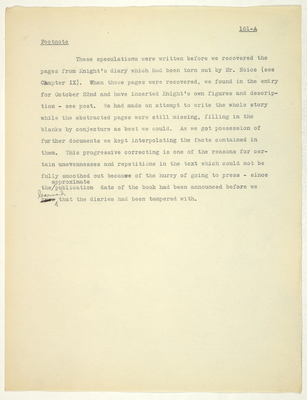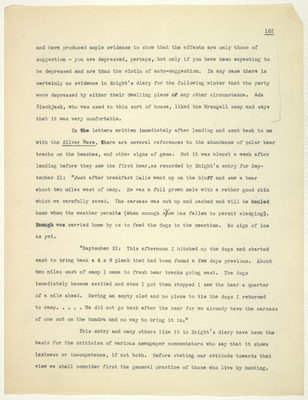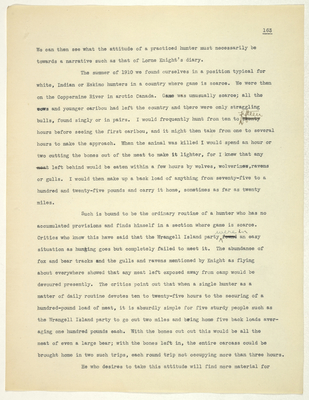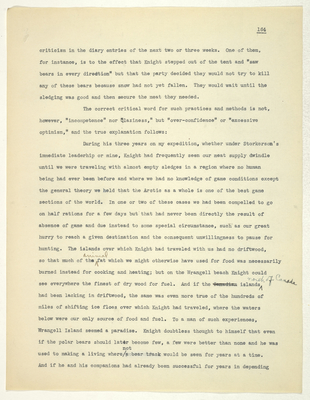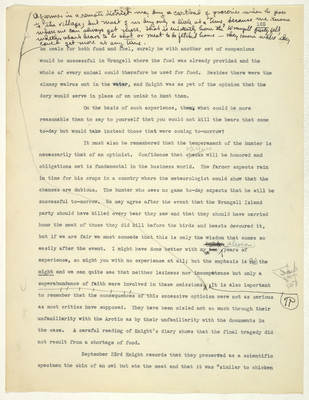Pages
stefansson-wrangel-09-29-006
161-A
Footnote
These speculations were written before we recovered the pages from Knight's diary which had been torn out by Mr. Noice (see Chapter IX). When those pages were recovered, we found in the entry for October 22nd and have inserted Knight's own figures and descriptions - see post. We had made an attempt to write the whole story while the abstracted pages were still missing, fillin in the blanks by conjecture as best we could. As we got possession of further documents we kept interpolating the facts contained in them. This progressive correcting is one of the reasons for cer tain enevennesses and repetitions in the text which could not be fully smoothed out because of the hurry of going to press - since the approximate publication date of the book had been announced before we learned knew that the diaries had been tampered with.
stefansson-wrangel-09-29-007
162
and have produced ample evidence to show that the effects are only those of suggestion - you are depressed, perhaps, but only if you have been expecting to be depressed and are thus the victim of auto-suggestion. In any case there is certainly no evidence in Knight's diary for the following winter that the party were depressed by either their dwelling place of any other circumstance. Ada Blackjack, who was used to this sort of house, liked the Wrangell camp and says that it was very comfortable.
In the letters written immediately after landing and sent back to me with the Silver Wave, there are several references to the abundance of polar bear tracks on the beaches, and other signs of game. But it was almost a week after landing before they saw the first bear, as recorded by Knight's entry for September 21: "Just after breakfast Galle went up to the bluff and saw a bear about two miles west of camp. He was a full grown male with a rather good skin which we carefully saved. The carcass was cut up and cached and will be hauled home when the weather permits (when enough snow has fallen to permit sledging). Enough was carried home by us to feed the dogs in the meantime. No sign of ice as yet.
"September 22: This afternoon I hitched up the dogs and started east to bring back a 4 x 6 plank that had been found a few days previous. About two miles east of camp I came to fresh bear tracks going east. The dogs immediately became excited and when i got them stopped I saw the bear a quarter of a mile ahead. Having an empty sled and no place to tie the dogs I returned to camp . . . . . We did not go back after the bear for we already have the carcass of one out on the tundra and no way to bring it in."
This entry and many others like it in Knight's diary have been the basis for the criticism of various newspaper commentators who say that it shows laziness or incompetence, if not both. Befrore stating our attitude towards that view we shall consider first the general practice of those who live by hunting.
stefansson-wrangel-09-29-008
163
We can then see what the attitude of a practiced hunter must necessarily be towards a narrative such as that of Lorne Knight's diary.
The summer of 1910 we found ourselves in a position typical for white, Indian or Eskimo hunters in a country where game is scarce. We were then on the Coppermine River in artic Canada. Game was unusually scarce; all the cows and younger caribou had left the country and there were only straggling bulls, found singly or in pairs. I would frequently hunt from ten to fifteen twenty hours before seeing the first caribou, and it might then take from one to several hours to make the approach. When the animal was killed I would spend an hour or two cutting the bones out of the meat to make it lighter, for I knew that any meat left behind would be eaten within a few hours by wolves, wolverines, ravens or gulls. I would then make up a back load of anything from seventy-five to a hundred and twenty-five pounds and carry it home, sometimes as far as twenty miles.
Such is bound to be the ordinary routine of a hunter who as no accumulated provisions and finds himself in a section where game is scarce. Critics who know this have said that the Wrangell Island party were in found an easy situation as hunting goes but completely failed to meet it. The abundance of fox and bear tracks and the gulls and ravens mentioned by Knight as flying about everywhere showed that any meat left exposed away from camp would be devoured presently. The critics point out that when a single hunter as a matter of daily routine devotes ten to twenty-five hours to the securing of a hundred-pound load of meat, it is absurdly simple for five sturdy people such as the Wrangell Island party to go out two miles and bring home five back load averaging one hundred pounds each. With the bones cut out this would be all the meat of even a large bear; with the bones left in, the entire carcass could be brought home in two such trips, each round trip not occupying more than three hours.
He who desires to take this attitue will find more material for
stefansson-wrangel-09-29-009
164
criticism in the diary entries of the next two or three weeks. One of them, for instance, is to the effect that Knight stepped out of the tent and "saw bears in every direction" but that the party decided they would not try to kill any of these bears because snow had no yet fallen. They would wait until the sledging was good and then secure the meat they needed.
The correct critical word for such practices and methods is not, however, "incompetence" nor "laziness," but "over-confidence" or "excessive optimism," and the true explanation follows:
During his three years on my expedition, whether under Storkerson's immediate leadership or mine, Knight had frequently seen our meat supply dwindle until we were traveling with almost empy sledges in a region where no human being had ever been before and where we had no knowledge of game conditions except the general theory we held that the Arctic as a whole is one of the best game sections of the world. In one or two of these cases we had been compelledto go on half rations for a few days but that had never been directly the result of absence of game and due instead to some special circumstance, such as our great hurry to reach a given destination and the consequent unwillingness to pause for hunting. The islands over which Knight had traveled with us had no driftwood, so that much of the animal fat which we might otherwise have used for food was necessarily burned instead for cooking and heating; but on the Wrangell beach Knight could see everywhere the finest of dry wood for fuel. And if the Canadian islands north of Canada had been lacking in driftwood, the same was even more true of the hundreds of miles of shifting ice floes over which Knight had traveled, where the waters belowe were our only source of food and fuel. To a man of such experiences, Wrangell Island seemed a paradise. Knight doubtless thought to himself that even if the polar bears should later become few, a few were better than none and he was used to making a living where/ not a bear track would be seen for years at a time. And if he and his companions had already been successful for year in depending
stefansson-wrangel-09-29-010
165
on seals for both food and fuel, surely he with another set of companions would be successful in Wrangell where the fuel was already provided and the whole of every animal could therefore be used for food. Besides there were the clumsy walrus out in the water, and Knight was as yet of the opinion that the dory would serve in place of an umiak to hunt them.
On the basis of such experience, then, what could be more reasonable than to say to yourself that you would not kill the bears that came to-day but would take instead those that were coming to-morrow?
It must also be remembered that the temperament of the hunter is necessarily that of an optimist. Confidence that []checks will be honored and obligations met is fundamental in the business world. The farmer expects rain in time for his crops in a country where the meteorologist could show that the chances are dubious. The hunter who sees no game to-day expects that he will be successful to-morrow. We may agree after the event that the Wrangell Island party should have killed every bear they saw and that they should have carried home the meat of those they did kill before the birds and beasts devoured it, but if we are fair we must concede that this is only the wisdom that comes so easily after the event. I might have done better with my ten twelve eleven years of experience, so might you with no experience at all; but the emphasis is on the might and we can quite see that neither laziness nor incompetence but only a superabundance of faith were involved in these omissions.
A farmer in a remote district may buy a cartload of groceries when he goes to the village; but most of us buy a little at a time, because we know where we can always get more. That is evidently how the Wrangell party felt, wheather about bears to be shot or meat to be fetched home - they knew where they could get more at any time.
It is also important to remember that the consequences of this excessive optimism were not as serious as most critics have supposed. They have been misled not so much through their unfamiliarity with the Arctic as by their unfamiliarity with the documents in the case. A careful reading of Knight’s diary shows that the final tragedy did not result from a shortage of food.
September 23rd Knight records that they preserved as a scientific specimen the skin of an owl but ate the meat and that it was "similar to chicken
